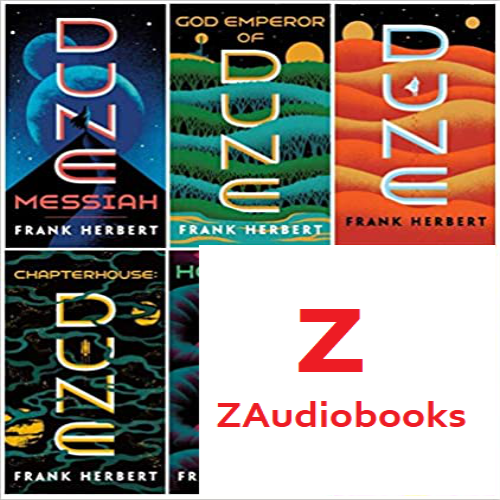This is Dune full series audiobook (rate button is after the title, please rate and leave a comment to share your thoughts. If the the description is missing, we will update soon or you can share anything you know about this audios it in comments section. Thank @James for sharing this audios). Lets play Dune full series full audios free online in the audio player below.

“Dune” is a landmark science fiction series written by Frank Herbert, and it has become one of the most iconic and influential works in the genre. The series, encompassing multiple novels and prequels, explores complex themes such as politics, religion, ecology, and human nature. While the series includes several books.
1. “Dune” (1965): The series begins with “Dune,” set in the distant future where interstellar travel and political intrigue abound. The story revolves around the desert planet Arrakis, the only source of the valuable spice melange. Young Paul Atreides, the heir to House Atreides, moves with his family to Arrakis to oversee spice production. The novel explores themes of prophecy, political power, and the ecology of the desert planet. Paul undergoes a transformative journey, eventually becoming the Kwisatz Haderach, a prophesied figure with extraordinary abilities.
2. “Dune Messiah” (1969): The sequel, “Dune Messiah,” is set several years after the events of “Dune.” Paul Atreides struggles with the consequences of his rise to power and the challenges of ruling the universe. The narrative explores themes of religion, sacrifice, and the complexities of leadership. As political alliances shift and plots unfold, Paul faces personal and political dilemmas that shape the fate of the galaxy.
3. “Children of Dune” (1976): “Children of Dune” continues the Atreides saga. Paul’s children, Leto II and Ghanima, face the legacy of their family’s rule. The narrative delves into themes of tyranny, sacrifice, and the consequences of prescience. Leto II undergoes a profound transformation, becoming the God Emperor with a vision for humanity’s future. The novel explores the cyclical nature of power and the challenges of breaking free from destiny.
4. “God Emperor of Dune” (1981): Set thousands of years after the events of “Children of Dune,” “God Emperor of Dune” focuses on Leto II’s rule as the God Emperor. Leto, who has transformed into a sandworm-human hybrid to extend his life, grapples with the Golden Path—a vision to ensure humanity’s survival. The novel delves into themes of tyranny, sacrifice, and the cyclical nature of history. Leto’s reign is marked by both authoritarianism and a deeper understanding of humanity’s potential.
5. “Heretics of Dune” (1984): “Heretics of Dune” shifts the focus to a new era, where the Bene Gesserit and the Tleilaxu vie for control. The Bene Gesserit face challenges to their breeding program, and the mysterious Honored Matres, a splinter group with a dark agenda, emerges. The narrative introduces new characters and explores themes of cultural evolution, rebellion, and the ever-changing nature of power in the Dune universe.
6. “Chapterhouse: Dune” (1985): The final novel in Frank Herbert’s original series, “Chapterhouse: Dune,” follows the continued struggles of the Bene Gesserit against external threats. The narrative explores the nature of the mysterious sandworms, the role of prescience, and the ongoing quest for control over spice production. The novel sets the stage for future developments, but Frank Herbert’s untimely death leaves the overarching storyline incomplete.
Prequels and Sequels by Brian Herbert and Kevin J. Anderson: After Frank Herbert’s death, his son Brian Herbert and author Kevin J. Anderson expanded the “Dune” universe with prequels and sequels based on Herbert’s notes. The prequels explore the history of the Dune universe, including the Butlerian Jihad and the founding of the Bene Gesserit. The sequels, beginning with “Hunters of Dune” and “Sandworms of Dune,” attempt to conclude the original storyline and address the unresolved plot points.
Key Themes Across the Series: The “Dune” series explores a multitude of interconnected themes. These include:
- Political Intrigue: The struggle for control over Arrakis and the spice melange is a central theme, with various factions vying for power and influence.
- Religion and Prophecy: The concept of prophecy, messianic figures, and the influence of religion on political power are recurring themes.
- Ecology: The delicate ecological balance of Arrakis, the role of the sandworms, and the impact of human activities on the environment are explored in depth.
- Power and Leadership: The complexities and consequences of leadership, the cyclical nature of power, and the pitfalls of absolute rule are central to the narrative.
- Prescience: The ability to see the future and the limitations and dangers associated with prescience are recurring themes, shaping the destiny of characters.
- Humanity and Evolution: The evolution of humanity, both biologically and culturally, is a continual theme, exploring the potential for change and adaptation.
In conclusion, the “Dune” series by Frank Herbert, along with the subsequent works by Brian Herbert and Kevin J. Anderson, constitutes a rich and expansive exploration of science fiction themes. From the political intrigues of Arrakis to the metaphysical complexities of prescience, the series offers a thought-provoking and intricate journey through the vast universe Herbert created. While the original six novels by Frank Herbert form the core of the series, the expanded universe provides additional context and stories for fans of the Dune universe to explore.


